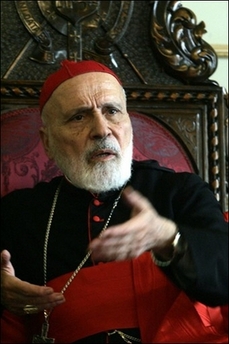 In his annual Christmas message on Friday, influential Cardinal Nasrallah Sfeir, head of the Maronite Catholic community from which Lebanon’s presidents are drawn, urged all parties to unite and end Lebanon’s political vacuum. "We have to reject hatred… and stop seeking personal interests at the expense of national interests," he said. "The presidency has been vacant for more than half a month, parliament has been paralysed for about a year and our government is limping with some cabinet members pursuing a strike," he said.
In his annual Christmas message on Friday, influential Cardinal Nasrallah Sfeir, head of the Maronite Catholic community from which Lebanon’s presidents are drawn, urged all parties to unite and end Lebanon’s political vacuum. "We have to reject hatred… and stop seeking personal interests at the expense of national interests," he said. "The presidency has been vacant for more than half a month, parliament has been paralysed for about a year and our government is limping with some cabinet members pursuing a strike," he said.
On Thursday, US President George W. Bush accused Damascus of seeking to destabilise Lebanon despite having withdrawn troops from its smaller neighbour in April 2005 after 29 years of military domination."It is very important that Lebanon’s democracy succeed. I worked with the French to get Syria out of Lebanon, and Syria needs to stay out of Lebanon. Syria needs to let the process in Lebanon work," Bush said. US President George W. Bush on Thursday ruled out direct talks with Syrian President Bashar al-Assad, saying his "patience ran out" on the Syrian leader "a long time ago.""So if he’s listening, he doesn’t need a phone call, he knows exactly what my position is," Bush said at a year-end press conference, after being asked whether he would talk to Assad to work on ending Lebanon’s political crisis."My patience ran out on President Assad a long time ago, and the reason why is because he houses Hamas, he facilitates Hezbollah, suiciders go from his country into Iraq and he destabilizes Lebanon," said Bush. The president said he was particularly vexed by what he said were Syria’s continued alleged efforts to foment instability in Lebanon, despite having withdrawn troops from there in April 2005. He also has suggested for the Parliament to go ahead with the vote without the votes of the opposition, and informed them that the world will support them even if there is no 2/3 of the votes.
Syrian Foreign Minister Walid Muallem accused Washington of blocking what he called Syrian and French efforts to end the Lebanese deadlock. "They want the majority to monopolise the political decision-making process, instead of, as we and the French believe, all the parties being treated equally," he said. They want the (parliamentary) majority to monopolise the political decision-making process, instead of, as we and the French believe, all the parties being treated equally."He said a proposed Damascus-Paris solution aimed to agree a declaration of three principles; election of the army chief, General Michel Sleiman, after amending the constitution; formation of a national unity government and a fair rewriting of the electoral law.
In reaction, " Sarkozy said that he wishes that this date be respected and that a solution on the electoral process be found," presidential spokesman David Martinon told a news conference. "(Sarkozy told Assad) again that France was more than ever committed to the election of a Lebanese president, a president of a broad appeal," Martinon said.
the opposition in Lebanon, accused Bush of "using its tools" — the majority coalition — to thwart attempts to reach a compromise over the presidency. "No, Bush, your orders cannot be implemented in Lebanon and your tutelage is rejected," Hezbollah number two Naim Kassem said in a statement on Friday. Lebanon’s leader Michel Aoun said Friday that a parliamentary session scheduled for Saturday with the purpose of electing a new president will not go ahead, as no agreement had been reached between rival political factions. "There will no session but we hope for something positive after the holidays," Aoun said during a press conference.
Lebanese Information Minister Marwan Hamadeh said Muallem’s remarks were "deceptive." "As usual, the Syrian minister is fooled by his own deceptiveness, believing that it is still the era when Syria formed Lebanese governments," Hamadeh said in Beirut.Majority MPs Nayla Moawad and Elias Atallah told AFP on Friday that their camp was not seeking to impose a president, preferring to pursue efforts for a compromise accord with the opposition.But Moawad warned that "after the recent remarks by Muallem and Syrian Deputy President Faruq Shara, it is clear that the Syrian regime has taken the decision to block the presidential vote. "They want to create a crisis to prevent Lebanon from having a strong and independent state. They want to cause chaos to be able to use Lebanon as a negotiating card for their own interests," she said.
 BEIRUT: Politically, 2007 was a year of intense activity in Lebanon, but with few tangible results. It was a year of looming constitutional vacuums, incessant political bickering, and near total legislative inertia, as the doors of Parliament remained shut, and the country was left without a head of state, just a Cabinet whose own legitimacy was questioned. An encampment of opposition supporters in Downtown Beirut laying siege to what they saw as the ruling coalition’s "monopoly on power" is what many will remember of the past year. What began as a resignation of opposition ministers in protest over the path the government was taking snow-balled into a major political crisis as 2006 came to a close. Little did anyone know that the sit-in near the Grand Serail would last for more than a year.
BEIRUT: Politically, 2007 was a year of intense activity in Lebanon, but with few tangible results. It was a year of looming constitutional vacuums, incessant political bickering, and near total legislative inertia, as the doors of Parliament remained shut, and the country was left without a head of state, just a Cabinet whose own legitimacy was questioned. An encampment of opposition supporters in Downtown Beirut laying siege to what they saw as the ruling coalition’s "monopoly on power" is what many will remember of the past year. What began as a resignation of opposition ministers in protest over the path the government was taking snow-balled into a major political crisis as 2006 came to a close. Little did anyone know that the sit-in near the Grand Serail would last for more than a year. 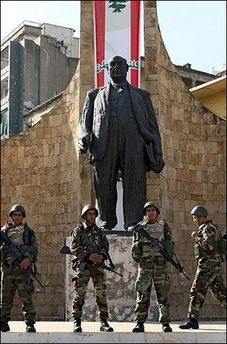 By Robert F Worth, Lebanon may seem an unlikely holiday spot: the government has collapsed, car bombs go off periodically and foreign envoys warn of an impending civil war.And yet, so many people have been streaming into this tiny, embattled country in recent days that the flights are all overbooked, and some well-heeled travelers are driving 18 hours from the Persian Gulf. Beirut’s restaurants, bars and malls are all packed with revelers.
By Robert F Worth, Lebanon may seem an unlikely holiday spot: the government has collapsed, car bombs go off periodically and foreign envoys warn of an impending civil war.And yet, so many people have been streaming into this tiny, embattled country in recent days that the flights are all overbooked, and some well-heeled travelers are driving 18 hours from the Persian Gulf. Beirut’s restaurants, bars and malls are all packed with revelers. In his annual Christmas message on Friday, influential Cardinal Nasrallah Sfeir, head of the Maronite Catholic community from which Lebanon’s presidents are drawn, urged all parties to unite and end Lebanon’s political vacuum. "We have to reject hatred… and stop seeking personal interests at the expense of national interests," he said. "The presidency has been vacant for more than half a month, parliament has been paralysed for about a year and our government is limping with some cabinet members pursuing a strike," he said.
In his annual Christmas message on Friday, influential Cardinal Nasrallah Sfeir, head of the Maronite Catholic community from which Lebanon’s presidents are drawn, urged all parties to unite and end Lebanon’s political vacuum. "We have to reject hatred… and stop seeking personal interests at the expense of national interests," he said. "The presidency has been vacant for more than half a month, parliament has been paralysed for about a year and our government is limping with some cabinet members pursuing a strike," he said.  By Challiss McDonough,
By Challiss McDonough, 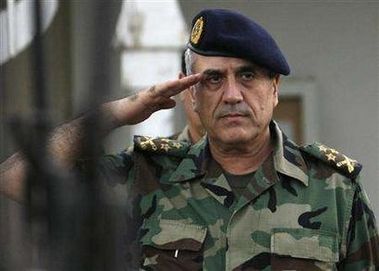 BEIRUT (AFP)–Lebanon’s presidential election was postponed for a ninth time Monday, to December 22, despite intense international efforts to convince rival parties to strike a deal and end a dangerous political vacuum. "The parliament session that was scheduled today has been postponed to Saturday December 22 at 12:30 p.m. (1030 GMT)," Mohamed Ballout, spokesman for parliament speaker Nabih Berri, told reporters.
BEIRUT (AFP)–Lebanon’s presidential election was postponed for a ninth time Monday, to December 22, despite intense international efforts to convince rival parties to strike a deal and end a dangerous political vacuum. "The parliament session that was scheduled today has been postponed to Saturday December 22 at 12:30 p.m. (1030 GMT)," Mohamed Ballout, spokesman for parliament speaker Nabih Berri, told reporters.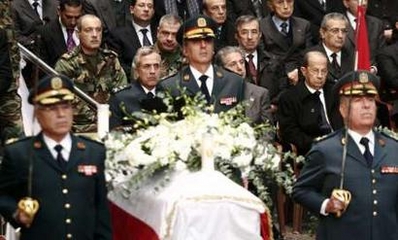 Lebanon – Lebanese politicians and military officers bade a mournful farewell to the martyr one of the top generals’ Francois el Hajj and his bodyguard Khairallah Hadwane Friday in a funeral that briefly united the deeply divided country. Hundreds of grieving Lebanese stood in a downpour along the route of Maj. Gen. Francois Hajj’s flag-draped casket from his home in a Beirutsuburb to the Maronite Catholic basilica in the Christian mountain heartland north of the capital.
Lebanon – Lebanese politicians and military officers bade a mournful farewell to the martyr one of the top generals’ Francois el Hajj and his bodyguard Khairallah Hadwane Friday in a funeral that briefly united the deeply divided country. Hundreds of grieving Lebanese stood in a downpour along the route of Maj. Gen. Francois Hajj’s flag-draped casket from his home in a Beirutsuburb to the Maronite Catholic basilica in the Christian mountain heartland north of the capital.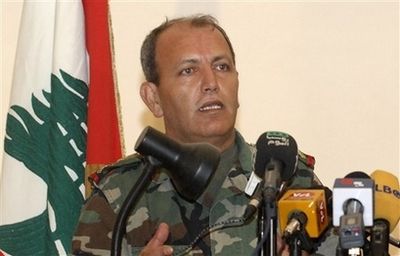 The Khazen family offers its deepest condoleances to the families of the martyrs General Francois Hajj, and Khairallah Hedwan . BEIRUT — A car bomb attack killed one of Lebanon’s top generals and at least two other people Wednesday, the military and state media said, putting even more pressure on the country’s delicate political situation. The target of the attack, Brig. Gen. Francois Hajj, a top Maronite Catholic in the command, was considered a leading candidate to succeed the head of the military, Gen. Michel Suleiman, if Suleiman is elected president. Hajj, 55, also led a major military campaign against Islamic militants over the summer. The blast is the first such attack against the Lebanese army, which has remained neutral in Lebanon’s yearlong political crisis and is widely seen as the only force that can hold the country together amid the bitter infighting between parliament’s rival factions. Syrian Foreign Minister Walid al-Moualem denounced the "criminal attack" on Hajj. "We condemn any action that threatens Lebanon," he said. Hajj helped lead an army onslaught on al Qaedainspired militants at the Nahr al-Bared Palestinian refugee camp in northern Lebanon this year in which 168 soldiers and about 230 Fatah al-Islam fighters were killed.
The Khazen family offers its deepest condoleances to the families of the martyrs General Francois Hajj, and Khairallah Hedwan . BEIRUT — A car bomb attack killed one of Lebanon’s top generals and at least two other people Wednesday, the military and state media said, putting even more pressure on the country’s delicate political situation. The target of the attack, Brig. Gen. Francois Hajj, a top Maronite Catholic in the command, was considered a leading candidate to succeed the head of the military, Gen. Michel Suleiman, if Suleiman is elected president. Hajj, 55, also led a major military campaign against Islamic militants over the summer. The blast is the first such attack against the Lebanese army, which has remained neutral in Lebanon’s yearlong political crisis and is widely seen as the only force that can hold the country together amid the bitter infighting between parliament’s rival factions. Syrian Foreign Minister Walid al-Moualem denounced the "criminal attack" on Hajj. "We condemn any action that threatens Lebanon," he said. Hajj helped lead an army onslaught on al Qaedainspired militants at the Nahr al-Bared Palestinian refugee camp in northern Lebanon this year in which 168 soldiers and about 230 Fatah al-Islam fighters were killed.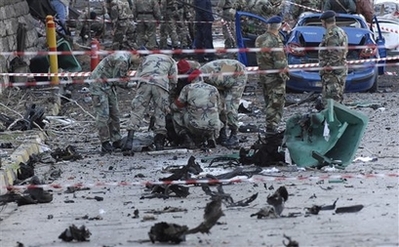 The main Christian opposition leader, Michel Aoun told reporters that he had supported Hajj to succeed Suleiman as army commander. Aoun, a former head of the military, praised Hajj and said it was "shameful" for political forces to take advantage of the crime. "We are facing a security catastrophe today," said Christian opposition leader Michel Aoun, calling on the interior minister to resign. Visibly shaken, the former army chief told reporters Hajj had been his preferred candidate for the top military post. Telecommunications Minister Marwan Hamadeh, speaking to AP Television News, accused the "Syrian-Iranian axis" of hitting the military, "the only body in Lebanon who can balance the power of Hezbollah and other militias in the country." But the Shiite Muslim Hezbollah, which has good relations with the army, denounced the killing. It called Hajj’s death a "great national loss" and praised the military’s "great national role" in preserving security. The White House denounced the killing. "We strongly condemn the assassination of Brig. Gen. Francois Hajj. This is a crucial time as Lebanon seeks to maintain a democratically elected government and select a new president," said National Security Council spokesman Gordon Johndroe. "President Bush will continue to stand with the Lebanese people as they counter those who attempt to undermine their security and freedom." Syrian Foreign Minister Walid al-Moualem denounced the "criminal attack" on Hajj. "We condemn any action that threatens Lebanon," he said.
The main Christian opposition leader, Michel Aoun told reporters that he had supported Hajj to succeed Suleiman as army commander. Aoun, a former head of the military, praised Hajj and said it was "shameful" for political forces to take advantage of the crime. "We are facing a security catastrophe today," said Christian opposition leader Michel Aoun, calling on the interior minister to resign. Visibly shaken, the former army chief told reporters Hajj had been his preferred candidate for the top military post. Telecommunications Minister Marwan Hamadeh, speaking to AP Television News, accused the "Syrian-Iranian axis" of hitting the military, "the only body in Lebanon who can balance the power of Hezbollah and other militias in the country." But the Shiite Muslim Hezbollah, which has good relations with the army, denounced the killing. It called Hajj’s death a "great national loss" and praised the military’s "great national role" in preserving security. The White House denounced the killing. "We strongly condemn the assassination of Brig. Gen. Francois Hajj. This is a crucial time as Lebanon seeks to maintain a democratically elected government and select a new president," said National Security Council spokesman Gordon Johndroe. "President Bush will continue to stand with the Lebanese people as they counter those who attempt to undermine their security and freedom." Syrian Foreign Minister Walid al-Moualem denounced the "criminal attack" on Hajj. "We condemn any action that threatens Lebanon," he said.


